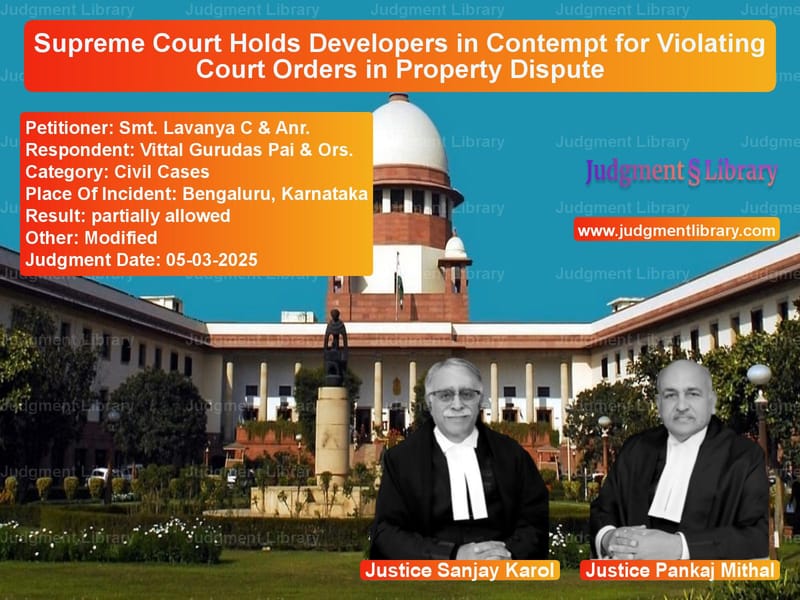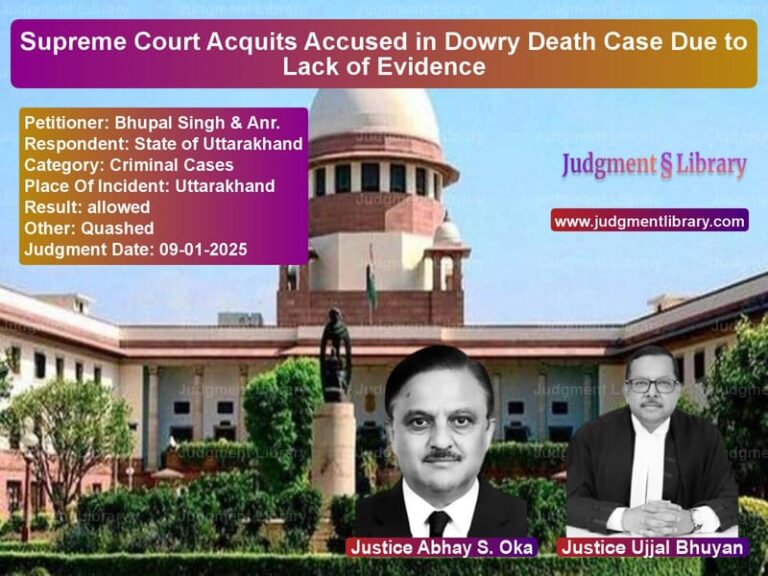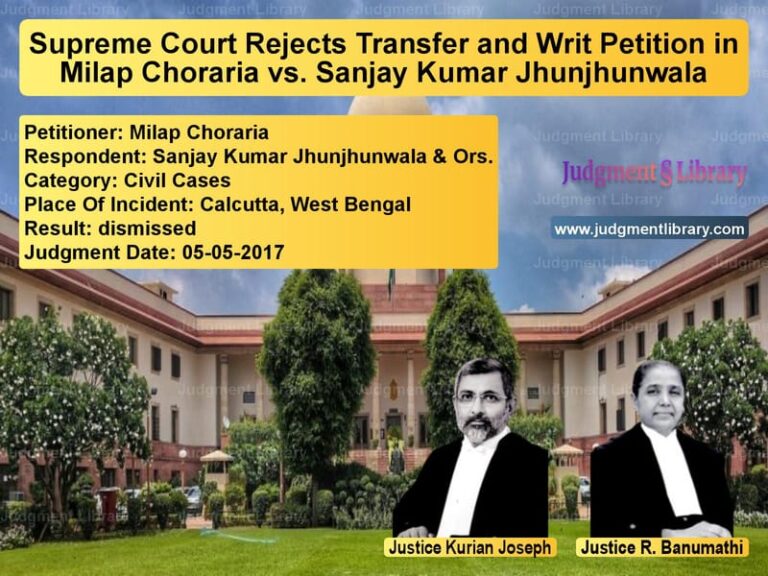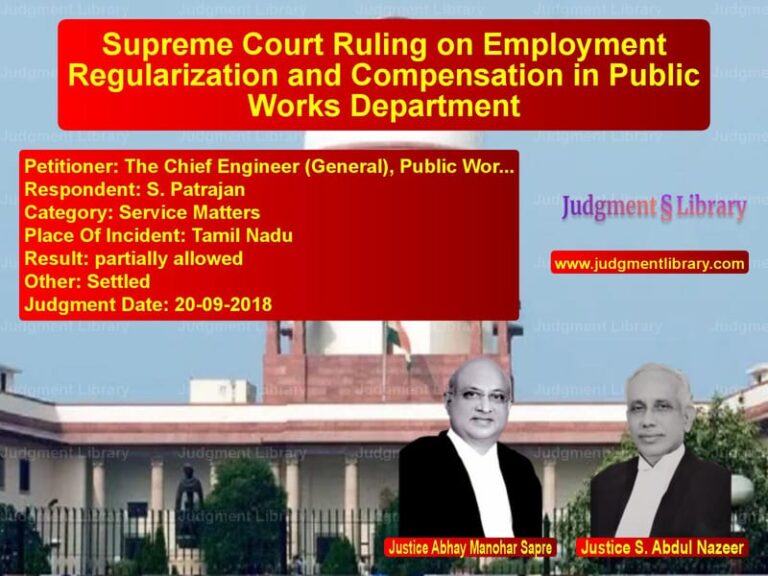Supreme Court Holds Developers in Contempt for Violating Court Orders in Property Dispute
The Supreme Court of India has ruled on a significant contempt case involving real estate developers violating an undertaking given to the trial court in the case of Smt. Lavanya C & Anr. v. Vittal Gurudas Pai & Ors.. The case revolved around a joint development agreement (JDA) for residential apartments, where the appellants were found guilty of disobeying the court’s order prohibiting alienation of the property.
Background of the Case
The dispute began with the signing of a Joint Development Agreement (JDA) on April 30, 2004, between the plaintiffs and defendants for the construction of residential apartments on a turnkey basis within 24 months, with a completion deadline of October 31, 2006. However, the project was not completed on time, leading to the plaintiffs issuing a legal notice on March 23, 2007, and eventually filing Original Suit No. 4191 of 2007 seeking a declaration that the JDA had been revoked.
During the pendency of the suit, the defendants provided an undertaking in the trial court on July 11, 2007, stating that they would not alienate the suit property. However, they subsequently sold multiple apartments despite the court’s order. The plaintiffs then moved for contempt proceedings under Order XXXIX Rule 2A of the Civil Procedure Code, which were initially dismissed by the trial court but later allowed by the High Court.
Key Legal Proceedings
- July 11, 2007: The defendants filed an undertaking before the trial court stating that they would not alienate the property.
- August 13, 2007: A second undertaking was filed by the defendants’ counsel reaffirming their commitment not to transfer ownership.
- November 17, 2007: The trial court issued an order formalizing the defendants’ undertaking.
- Between 2007 and 2009: The defendants executed multiple sale deeds in violation of the court’s directive.
- 2011: The plaintiffs filed an application under Order XXXIX Rule 2A, alleging willful disobedience.
- 2013: The trial court dismissed the contempt application, citing a lack of conclusive evidence.
- 2021: The Karnataka High Court overturned the trial court’s order, holding the defendants guilty of contempt.
- 2025: The Supreme Court upheld the High Court’s ruling but modified the punishment.
Arguments by the Appellants (Defendants)
- The defendants claimed that the plaintiffs’ suit lacked a specific prayer seeking to restrain them from creating third-party rights.
- They argued that there was an error in the trial court’s description of the suit property, making the injunction order ambiguous.
- The appellants contended that an unconditional apology was offered before the court, showing their willingness to comply.
- They highlighted that one of the appellants was a senior citizen suffering from health issues and argued that the imposed penalty was excessive.
Arguments by the Respondents (Plaintiffs)
- The plaintiffs emphasized that the defendants knowingly violated their own undertakings given before the trial court.
- The sale deeds executed after the court’s injunction were done deliberately to frustrate the execution of the agreement.
- The plaintiffs provided photographic evidence proving that construction was ongoing despite the claim that the land remained vacant.
- They argued that the defendants’ claim of ambiguity in the injunction order was an afterthought to escape liability.
Supreme Court’s Analysis
Violation of Undertaking
“The undertaking subject matter of controversy was given by the counsel on 11th July 2007 and reiterated on 13th August 2007. The trial court made such an undertaking into an order of the court on 17th November 2007. The same was extended at regular intervals. The application for violation of the undertaking was made in 2011, after a period of four and a half years. Had the undertaking been without requisite authority, the clients were perfectly within their rights to seek discharge of that order. However, no such step was taken.”
Legal Precedents Considered
- Samee Khan v. Bindu Khan (1998) 7 SCC 59: Established that disobedience of an injunction order does not get erased even if the order is later set aside.
- Kanwar Singh Saini v. High Court of Delhi (2012) 4 SCC 307: Reinforced that violations of injunction orders must be addressed seriously.
- Himalayan Coop. Group Housing Society v. Balwan Singh (2015) 7 SCC 373: Affirmed that lawyers owe fiduciary duties to their clients and must not act beyond their authority.
- Supreme Court Bar Association v. Union of India (1998) 4 SCC 409: Highlighted that contempt jurisdiction ensures the dignity and majesty of law.
Final Judgment
The Supreme Court upheld the High Court’s ruling, holding the defendants guilty of contempt. However, it modified the punishment:
- The three-month confinement in civil prison imposed on the second appellant was deleted.
- The property attachment order remained in force.
- The fine was increased from ₹10 lakh to ₹13 lakh, with an additional 6% interest from the date of the trial court’s judgment.
Key Takeaways from the Judgment
- Strict Enforcement of Court Orders: The ruling underscores that court undertakings and injunction orders must be strictly followed.
- Accountability in Real Estate Transactions: Developers cannot use legal loopholes to bypass obligations in joint development agreements.
- Contempt of Court Has Serious Consequences: Violators can face significant penalties, including fines and property attachment.
- Fiduciary Responsibility of Lawyers: Advocates must act within their authority and cannot bind clients to undertakings without explicit consent.
Conclusion
The Supreme Court’s judgment serves as a strong deterrent against the violation of court orders in property disputes. It affirms that developers must adhere to their legal commitments and that courts will not hesitate to impose penalties on those who attempt to circumvent justice. The ruling reinforces the sanctity of legal proceedings and ensures that injunctions and undertakings given before courts are not taken lightly.
Petitioner Name: Smt. Lavanya C & Anr..Respondent Name: Vittal Gurudas Pai & Ors..Judgment By: Justice Sanjay Karol, Justice Pankaj Mithal.Place Of Incident: Bengaluru, Karnataka.Judgment Date: 05-03-2025.
Don’t miss out on the full details! Download the complete judgment in PDF format below and gain valuable insights instantly!
Download Judgment: smt.-lavanya-c-&-anr-vs-vittal-gurudas-pai-&-supreme-court-of-india-judgment-dated-05-03-2025.pdf
Directly Download Judgment: Directly download this Judgment
See all petitions in Property Disputes
See all petitions in Specific Performance
See all petitions in Contempt Of Court cases
See all petitions in Judgment by Sanjay Karol
See all petitions in Judgment by Pankaj Mithal
See all petitions in partially allowed
See all petitions in Modified
See all petitions in supreme court of India judgments March 2025
See all petitions in 2025 judgments
See all posts in Civil Cases Category
See all allowed petitions in Civil Cases Category
See all Dismissed petitions in Civil Cases Category
See all partially allowed petitions in Civil Cases Category







